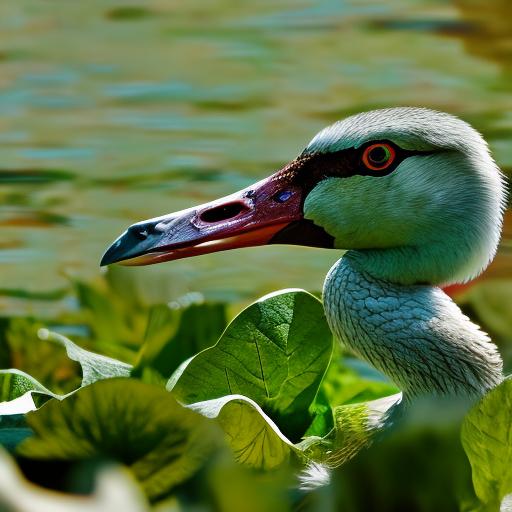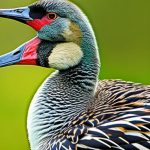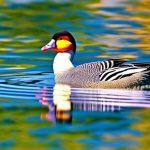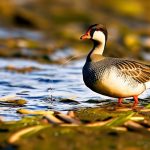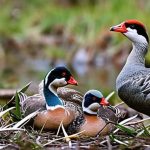Geese can be a beautiful sight to behold, gracefully gliding across a pond or flying in a V-formation overhead. However, when these majestic birds decide to make your garden their personal buffet, it can quickly become a frustrating and costly problem. Geese are known for their voracious appetites and can cause significant damage to plants, lawns, and crops. In order to protect your plants and maintain the beauty of your outdoor space, it is important to implement effective deterrents to keep geese at bay.
Key Takeaways
- Geese are social animals that prefer to stay in groups and are attracted to open spaces with water and food sources.
- Geese are attracted to certain plants, such as grasses and clovers, and can cause damage to gardens and crops.
- Physical barriers, such as fences and netting, can be effective in protecting plants from geese.
- Decoys, such as fake predators or other animals, can be used to deter geese from landing in certain areas.
- Scare tactics, such as loud noises or flashing lights, can also be effective in keeping geese away from plants.
Understanding the behavior of geese
Geese are attracted to certain areas for a variety of reasons. One of the main factors that draws geese to an area is the presence of water. Geese are waterfowl and require access to water for drinking, bathing, and nesting. If you have a pond or other body of water on your property, it is likely that geese will be attracted to it.
Geese also prefer areas with open spaces and short grass. This is because they have a clear line of sight and can easily spot any potential predators. Additionally, short grass makes it easier for geese to graze on the vegetation that they prefer.
Identifying the plants that geese are attracted to
Geese have a varied diet and will eat a wide range of plants. Some common plants that geese are known to eat or damage include grasses, sedges, clover, dandelions, lettuce, and various types of grains. Geese are particularly fond of tender young shoots and will often target newly planted gardens or lawns.
Creating physical barriers to protect plants
One of the most effective ways to keep geese away from your plants is by creating physical barriers. Fencing is a popular option for keeping geese out of specific areas. A fence should be at least three feet high and have small enough gaps between the bars to prevent geese from squeezing through. Additionally, it is important to bury the bottom of the fence at least six inches into the ground to prevent geese from digging under it.
Netting can also be used to protect plants from geese. This involves covering the plants with a fine mesh netting that prevents geese from accessing them. However, it is important to ensure that the netting is securely fastened and does not pose a risk to other wildlife or pets.
Using decoys to deter geese
Another method for deterring geese is by using decoys. Geese are social animals and are more likely to avoid areas that are already occupied by other geese. By placing decoy geese in your garden or near your plants, you can trick real geese into thinking that the area is already occupied and they will move on to find another location.
Decoys can be made from a variety of materials, including plastic, wood, or even inflatable options. It is important to regularly move the decoys around to prevent geese from becoming accustomed to their presence.
Implementing scare tactics to keep geese away
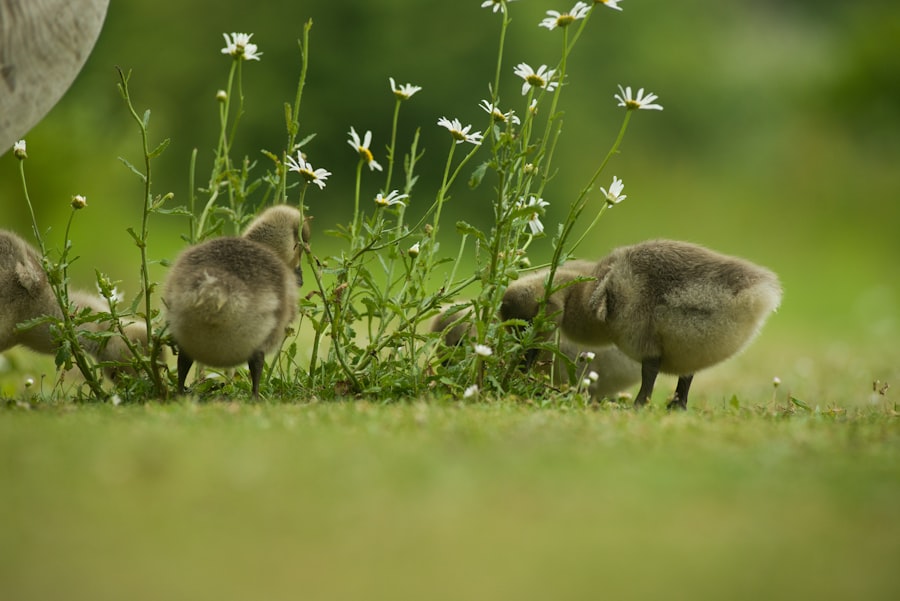
Scare tactics can also be effective in deterring geese from an area. Scarecrows are a classic option and can be made from old clothes stuffed with straw or other materials. The presence of a scarecrow can startle geese and make them think twice about approaching an area.
Balloons are another visual deterrent that can be effective in scaring away geese. By attaching balloons to stakes or poles near your plants, the movement and reflection of light can create an intimidating effect that will discourage geese from landing or grazing in the area.
Using sound devices to discourage geese
Noise-making devices can also be used to deter geese from an area. These devices emit loud noises or distress calls that mimic the sounds of predators or other geese in distress. The sudden and unexpected noise can startle geese and make them think twice about approaching an area.
Some common sound devices used to deter geese include propane cannons, motion-activated sprinklers, and ultrasonic devices. It is important to regularly change the location of these devices to prevent geese from becoming accustomed to the noise.
Applying repellents to plants
Chemical or natural repellents can be applied to plants to keep geese from eating or damaging them. These repellents create a taste or smell that is unappealing to geese and will deter them from feeding on the plants.
Chemical repellents can be purchased at garden centers or online and should be applied according to the manufacturer’s instructions. Natural repellents, such as garlic or hot pepper sprays, can also be effective in deterring geese. These can be made at home using common household ingredients.
Utilizing natural deterrents, such as predator urine
Natural deterrents, such as predator urine, can be used to keep geese away from an area. The scent of predator urine, such as that of a fox or coyote, can create a sense of danger for geese and make them think twice about approaching an area.
Predator urine can be purchased online or at hunting supply stores. It should be applied according to the manufacturer’s instructions and reapplied regularly to maintain its effectiveness.
Removing food sources near plants to deter geese
One of the most important steps in deterring geese is removing any food sources that may be attracting them to an area. This includes removing fallen fruit, birdseed, or any other food that may be accessible to geese.
Additionally, it is important to regularly clean up any spilled birdseed or pet food that may be attracting geese. By removing these food sources, you can make your garden less appealing to geese and encourage them to find food elsewhere.
Seeking professional help for persistent geese problems
In some cases, geese problems may persist despite your best efforts to deter them. If you are experiencing persistent geese problems that are causing significant damage or posing a threat to your property, it may be necessary to seek professional help.
There are companies that specialize in geese management and can provide expert advice and assistance in deterring geese from your property. These professionals may use a combination of methods, including habitat modification, harassment techniques, and population management strategies, to effectively control geese populations.
Protecting your plants from geese can be a challenging task, but with the right deterrents and strategies, it is possible to keep these birds at bay. By understanding the behavior of geese and implementing a combination of physical barriers, decoys, scare tactics, sound devices, repellents, natural deterrents, and removing food sources, you can create an environment that is less attractive to geese.
It is important to take action to protect your plants and maintain the beauty of your outdoor space. By implementing these deterrents and seeking professional help if necessary, you can ensure that your plants remain safe from the damaging effects of geese.
If you’re looking for effective ways to protect your plants from geese, you might also be interested in learning about the benefits of renting a chicken coop. Poultry Wizard offers a variety of chicken coop options, including the Chicken Coop Chester SC and the Hannah Montana Chicken Coop. Renting a chicken coop not only provides a safe and secure space for your feathered friends but can also help deter geese from invading your garden. Check out Poultry Wizard’s article on renting a chicken coop to discover how it can be a valuable solution for keeping geese away from your plants.
FAQs
What are some effective ways to keep geese away from plants?
There are several effective ways to keep geese away from plants, including using physical barriers, applying repellents, and using decoys.
What are some physical barriers that can be used to keep geese away from plants?
Physical barriers that can be used to keep geese away from plants include fences, netting, and floating row covers.
What are some repellents that can be used to keep geese away from plants?
Repellents that can be used to keep geese away from plants include taste repellents, such as hot pepper spray, and scent repellents, such as predator urine.
What are some decoys that can be used to keep geese away from plants?
Decoys that can be used to keep geese away from plants include fake predators, such as plastic owls or coyotes, and fake geese, such as inflatable or stationary decoys.
Are there any natural ways to keep geese away from plants?
Yes, there are some natural ways to keep geese away from plants, such as planting unappealing plants, such as prickly or thorny plants, or using natural predators, such as dogs or hawks.
Meet Walter, the feathered-friend fanatic of Florida! Nestled in the sunshine state, Walter struts through life with his feathered companions, clucking his way to happiness. With a coop that’s fancier than a five-star hotel, he’s the Don Juan of the chicken world. When he’s not teaching his hens to do the cha-cha, you’ll find him in a heated debate with his prized rooster, Sir Clucks-a-Lot. Walter’s poultry passion is no yolk; he’s the sunny-side-up guy you never knew you needed in your flock of friends!

